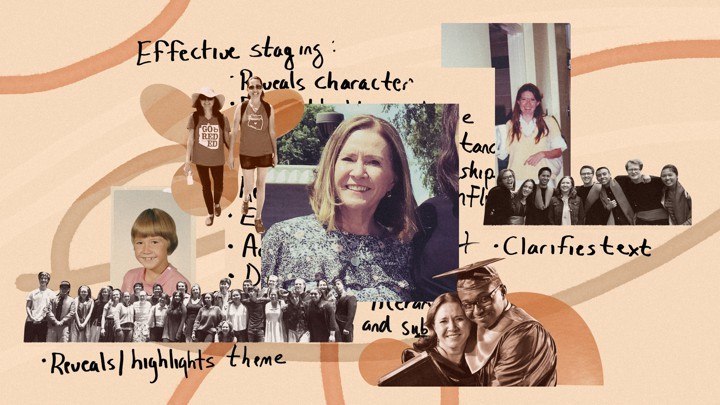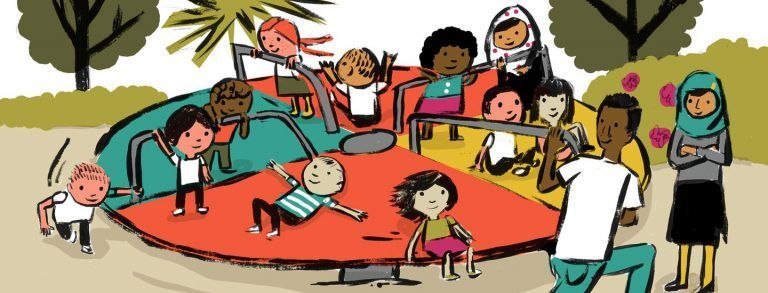Podcasts and poems and projects, oh my!
From helping students who have experienced trauma, to a poetry project, to a podcast rec. Here are 5 resources to start your week of teaching.

Succeed: A teacher’s story of surviving challenges, no matter what
Here’s an interesting fact: Teachers in countries like Japan and Finland spend an average of 21 hours or less teaching per week. They spend the rest of their paid time learning from peers to improve their teaching methods. Meanwhile, teachers in the U.S. spend an average of 28 hours a week teaching. Many teachers say they need professional development but have to seek it on their own time (often unpaid). With growing class sizes and all-too-frequent budget cuts, it’s no wonder so many teachers in our country end up leaving the profession. Worse, surveys show teachers don’t feel like their training prepared them for the challenges that take place in the classroom. In this story in The Atlantic, see how one teacher found a way to succeed over and over again throughout her nearly 40-year career as an educator. She says that early on in her career, the most helpful thing she did was to observe and learn from experienced teachers who keep their students on their toes.
Heal: How to help students suffering from trauma
Post-traumatic stress disorder, also known as PTSD, is real for more than just military veterans. Did you know that students can experience PTSD, too? What if a student’s family is struggling to recover after a natural disaster like a hurricane or tornado? Or what if a student is suffering from abuse at home? It’s no surprise that events like these can dramatically shift the upward trajectory of even the most ambitious students. That’s why more schools are looking for ways to support students who are working to overcome trauma. But doing so also poses a dilemma: Is it the school’s responsibility to help these students through their trauma? No matter what side of the debate you’re on, see how other schools and teachers are helping students cope in this story from EdWeek.

Speak: Beautiful words from the “I Wish I Had Known…” project
This story is different than what you’re used to seeing here. It’s a collection of poems written by 36 teachers about what they wish they knew before going into the teaching profession. What makes this beautiful collaboration so special? Every teacher who contributed is also a member of the Teaching Tolerance advisory board. Many of the contributors are teachers of color. And the poems reveal vulnerability about the challenges teachers faced and the feelings they experienced. Some lines are empowering, while others reveal cringe-worthy truths. Here are some of our favorite excerpts:
“I wish I had known that passion is not enough. And that patience is your friend and hard to muster.”
“I wish I had known that teaching consists of a lot of meetings and paperwork that can make your forget your main purpose.”
“I wish I had known my power would multiply over the years with my experience.”
Listen: Advice from educators who understand your struggle
If you like podcasts, you’ll love BAM! Radio Network’s show, “Classroom Q & A.” In every episode, the host poses thought-provoking questions to a group of educators who answer in round-robin fashion. That means every episode is filled with a wealth of knowledge, tips—and best of all—reassurance that you’re on the right track (or advice on how to get on the right track). The most recent episode asked: How do you know your students are engaged? Every teacher gave a similar response: Give students several opportunities to discuss what they’re learning with one another. Keeping a close ear on those conversations can give you a good idea of whether they’re engaged.
Counsel: High school students who lay down the law
Here’s one of our favorite examples of project-based learning right now: Since 2013, lawyers at the California Innocence Project have used students at High Tech High in Chula Vista as a resource to help with their caseload. The students review files of prisoners who say they’ve been wrongly convicted. Then, the students present their recommendation of whether the nonprofit should take on the case, based on their research and findings. Many students say this work feels more important than most classwork they’ve had in the past. But what’s the takeaway? Teachers at High Tech High say school shouldn’t be a preparation for real life, but that school should be real life, according to this story in The 74 Million. Be sure to read the full article for more great examples of project-based learning being applied in classrooms.
XQ X-tra
Take a FREE online course on Competency-Based Education from our friends at MIT.
Class begins Oct. 8
- Find out why so many educators are excited about CBE
- See how CBE can help close learning gaps in the classroom
- Learn how to implement CBE effectively
- Hear from teachers and experts at MIT already using CBE
- Course length: 6 weeks; 2-4 hours per week
Photo Credit: JUDITH HARPER / THE ATLANTIC
Illustration: ZACHARIAH OHORA









